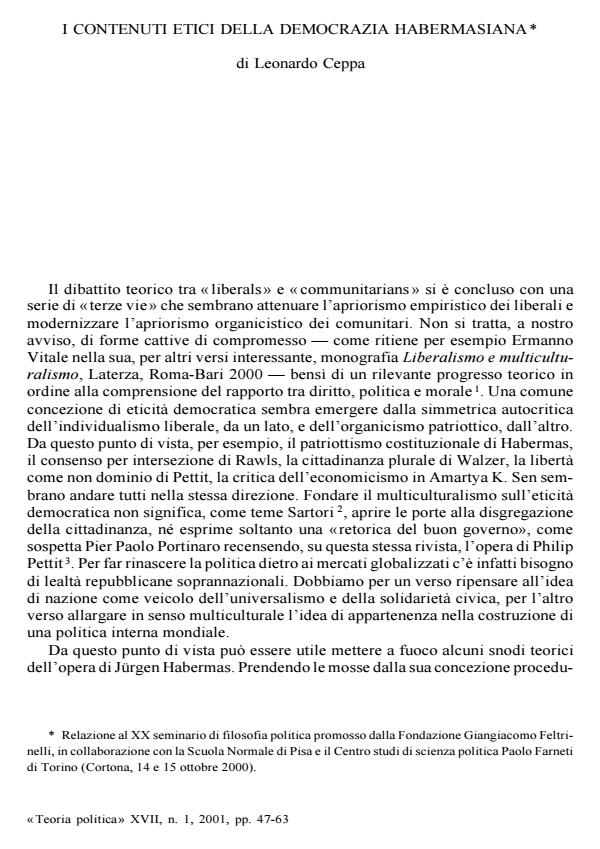I contenuti della democrazia habermasiana
Titolo Rivista TEORIA POLITICA
Autori/Curatori Leonardo Ceppa
Anno di pubblicazione 1 Fascicolo 2001/1 Lingua Italiano
Numero pagine 17 P. Dimensione file 51 KB
DOI
Il DOI è il codice a barre della proprietà intellettuale: per saperne di più
clicca qui
Qui sotto puoi vedere in anteprima la prima pagina di questo articolo.
Se questo articolo ti interessa, lo puoi acquistare (e scaricare in formato pdf) seguendo le facili indicazioni per acquistare il download credit. Acquista Download Credits per scaricare questo Articolo in formato PDF

FrancoAngeli è membro della Publishers International Linking Association, Inc (PILA)associazione indipendente e non profit per facilitare (attraverso i servizi tecnologici implementati da CrossRef.org) l’accesso degli studiosi ai contenuti digitali nelle pubblicazioni professionali e scientifiche
The essay focuses on the notion of democratic ethos by Jürgen Habermas. Taking the move from the tension between immanence and transcendence of democratic ethics, it illustrates the Habermas’ arguments about the risks implicit to the idea of collective rights, and about the decentrated, reactive and non-ethical qualities of cosmopolitan citizenship. The essay turns out in stressing some affinities and differences between the cosmopolitan democracy of Habermas and the law of peoples of John Rawls. Ceppa’s argument emphasizes two major points. In the first place, through the dialectic of contextuality and universality Habermas’ constitutional patriotism can, on the one hand, overcome liberal blindness towards ethical and cultural colours, and, on the other hand, disenchant the communitarian idea of total membership. Democracy needs solidarity, even though, on the historical level of modernity, this solidarity has universalistic and abstract qualities. Second, the efforts (for instance in John Rawls and Michael Walzer) to uncouple the idea of justice and legitimacy from western ideological perspectives can never go to the point of endangering the individualistic structure of positive law. Democratic ethos cannot go back and by-pass the principle of modern, subjective autonomy.;
Leonardo Ceppa, I contenuti della democrazia habermasiana in "TEORIA POLITICA" 1/2001, pp , DOI: